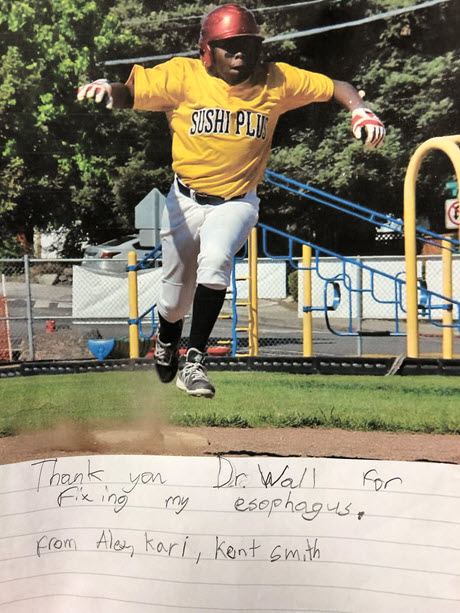Call us today
Contact us to learn more about our children’s surgery center or to schedule an appointment.

Eleven-year-old battles achalasia—and gets back to eating pizza—with the help of a new procedure called peroral endoscopic myotomy (POEM), developed at Stanford, that treats the condition with minimal pain and scarring.
On a Labor Day weekend in 2015, Alex Smith, then 11, was playing in a baseball tournament when he chugged a sports drink. A few seconds later, he threw up the entire bottle. Afterward, almost every time he tried to eat or drink anything, he had a nearly impossible time keeping it down.
Over the next several weeks, Alex and his parents—Kari and Kent Smith—went from doctor to doctor trying to figure out what was wrong. At first, doctors told him he had acid reflux. Then they blamed allergies. During that time the condition went unsuccessfully treated and Alex lost a staggering thirty-five pounds.
Finally, in October of 2015, he found himself in radiology at Stanford Medicine Children’s Health, where a worrisome x-ray sent him to the gastroenterologist, William Berquist, MD, who consulted with a surgeon, James Wall, MD. They quickly diagnosed Alex with esophageal achalasia, a condition where poor muscle function throughout the esophagus combined with tight muscle fibers in the lower esophagus prevents food and liquids from passing through to the stomach.
“It was such a huge relief to finally know,” says Alex’s mom Kari. “Even if it’s a diagnosis no one wants.”
Achalasia is a chronic disease with no cure. Fortunately, the disease’s effects can often be improved with surgery that cuts the tight muscles in the lower esophagus, though some patients may require multiple procedures throughout their lifetime.
Dr. Wall, who specializes in the treatment of this condition, consulted with the family to explain the condition and go over their options.
“When he met Dr. Wall,” says Kari Smith, “Alex wanted to know if he was ever going to be able to eat pizza again. Dr. Wall smiled and said, ‘Don’t worry, you’re going to be able to eat pizza again.’ It was then that I knew things were going to be okay.”
Dr. Wall had other good news for Alex and the Smith family. Historically, the surgery required to treat the condition sometimes resulted in pain and scarring but Dr. Wall was one of the few doctors in the world who could provide a new technique that could reduce some of these concerns. This procedure, called peroral endoscopic myotomy (POEM), allows doctors to cut the necessary muscles using a flexible tube that goes through the patient’s mouth rather than cutting into the thorax or abdomen.
POEM was first developed at Stanford in 2006 by Jay Pasricha, MD, and was first performed in an adult in 2008. In 2013, Dr. Wall and the team at Stanford Medicine Children’s Health became the first pediatric facility in North America to perform the procedure. It remains the only children’s hospital on the west coast, and one of only two nationally, to perform POEM.
For children with esophageal achalasia, the success in improving swallowing with POEM is similar to more invasive surgical approaches. Although not all children with achalasia will react quite this well to POEM or other more traditional surgical interventions, Alex’s procedure was a remarkable success.
“After the procedure,” says Dr. Wall, “he had to stay in the hospital for only one night. He didn’t require any significant pain medication and he was able to go home the next day. After two weeks, he started eating food and has done great ever since.”
Alex and his parents are equally thrilled with the results. Right after the surgery, Alex had to take some liquid medication. “His eyes were huge,” says Kari, “and he said, ‘Mom, I can feel it going down.’ It wasn’t a feeling he’d had for months.”
What’s better, they said, is that after three years post-surgery, they have only had to return for two scheduled follow-ups and there have been very few problems.
As for Alex, he is happy to be back playing baseball. In fact, he gave Dr. Wall a picture of himself with a note that reads, “Thank you, Dr. Wall, for fixing my esophagus.”
“It’s really rewarding,” says Dr. Wall, “to see Alex go from being scared and nervous about eating, understandably, to being back into baseball and just a jovial, happy kid.”
Connect with us:
Download our App: